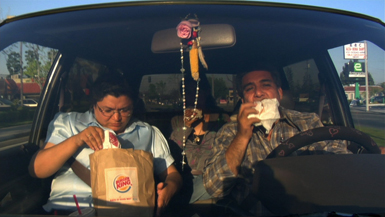Make an Argument: Documentaries
By Eric Hughes
August 10, 2011
When I’m in the mood for them, documentaries can be some of the most interesting – and sometimes more, entertaining – things on the planet. I love a good documentary, don’t you? They’re less work (and time) than paging through a piece of historical fiction, and when done right, can leave lasting impressions on, well, me.
I’ve seen a few notable ones recently, and thought I’d devote Make an Argument this week to what made them great. Two of them, actually, moved me to tears, and I’ll be the first to admit that that doesn’t happen to me often (documentary, or otherwise). Far from a heartless bastard, I need to be struck by just the right amount of – you know… - for my eyes to start wellin’.
Documentaries are underserved here on BOP, and I’ve yet to talk about them in this space, too, so here goes. They’re in the order I saw them, which so happens to match my list of least liked to most liked, too:
Food, Inc. (2008)
Watching Food, Inc. was like unwrapping the wool from my eyes in real time. I mean, talk about eye opening – I’d no idea the industry was this effed up! From the government subsidizing the components that most benefit corporations to one company controlling the genetically engineered seed market to food titans buying up all the organics and DIYers you mistakenly thought were totally independent, Food, Inc. covered a ton of space in an hour and a half – and left me feeling quite bleak that the industry could ever reverse itself.
Like a lot of business saturated with greed, the food industry is caught in an unsustainable trap of how to maximize profit margins at the expense of health and safety. This comes through, visually, through plumping up chickens so much that they can barely walk (if, well, they can first upright themselves on their feet), feeding cows with cheap nosh – mainly corn – that just isn’t natural for them to eat and stripping farmers of their creativity as growers to conform their farms into just one more cog in the big wheel of mistake.
According to the film, all that home style, Midwestern food packaging on meat and other products is a total misconception. The industry isn’t at all like the endlessly green pastures and happy little sheep marketing makes it out to be.
Though the subject matter is heavy, it’s presented in an easy to follow, cookie cutter format. Almost like the creators of it stole from the Michael Moore playbook on how to keep viewers engaged.
Continued:
1
2
|
|
|
|




